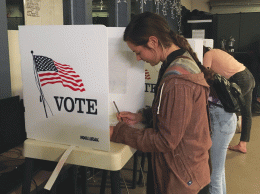By Steven Mintz on Oct. 19, 2012
Mitt Romney argues that business must be allowed to follow free-market principles unfettered by regulations such as the 2010 Dodd-Frank Financial Reform Act, while President Obama believes regulation is needed to prevent another meltdown of our financial system such as the one that occurred five years ago. Who is right? The answer is that both are. That’s why it is so difficult to know where the true answer lies as capitalism is questioned by movements such as “Occupy Wall Street” and spinoff protests.
A free-market economic system depends on the exercise of ethical behavior by corporate officials to provide for the public good. Absent decision-making based on ethical values such as honesty, objectivity and integrity, and transparency, the system cannot be trusted to allocate resources in the best interests of society. The root cause of such problems is the pursuit of self-interests to the exclusion of all others. The way it is supposed to work is that Corporate America would regulate itself and the government would stay out of its way — Romney’s position. Clearly, that has not worked for some time.
The financial crisis that started in 2007 resulted in large part from unethical conduct including making home mortgage loans when financial institutions knew (or should have known) that borrowers were not qualified — a fact that was ignored (or overlooked) so that these institutions could earn large fees from closing and other transaction costs. This scandal came on the heels of accounting frauds in the early 2000s at companies such as Enron, WorldCom, Tyco and Health South that shredded billions of dollars of shareholder wealth while top management pay packages at these companies were in the multi-millions. That led to passage of the Sarbanes-Oxley Act of 2002.
It is important to remember that Adam Smith connected ethics to economics. Smith came to his philosophy of economic behavior described in “The Wealth of Nations” through his view of moral behavior espoused in his first book, “The Theory of Moral Sentiments.” Smith, generally regarded to be the founder of free-market economics, posited that rational self-interest informed by moral judgments based on fairness and justice would promote the best interests of society, guided by the “invisible hand” of the marketplace. What is missing from the calculation of recent economic decision making is the ethical decision-making side of that theory.
Corporate actions should be guided by the following question: What are the rights of shareholders and other stakeholders and what are the obligations of CEOs and boards of directors to those parties? A case in point is multimillion-dollar severance packages. How is it in the best interest of shareholders for CEOs to walk away with multimillion-dollar severance packages? Perhaps the most glaring example of unfairness is the $130 million package given to Michael Ovitz in 2005, after he was fired as CEO of Walt Disney & Co. by Michael Eisner, the chair of Disney’s board of directors, just 15 months after being hired. Notwithstanding the fact that the Delaware Chancery Court upheld the legality of the payment, boards need to be held ethically accountable for such actions.
The nature of the present economic crisis illustrates the need for departures from uncontrolled self-dealing for the good of society. Smith had a diagnosis for this: He called such promoters of excessive risk in search of profits “prodigals and projectors,” an appropriate description of many of the promoters of credit-swap insurances and sub-prime mortgages in the recent past.
But more government regulation — Obama’s position — is not the answer. Recent efforts at financial regulatory reform may stem the tide in the short-run. However, in the long-run we should expect new and “creative” attempts at financial engineering to benefit the few to the detriment of the many.
The more important point is to investigate abuses and hold the perpetrators accountable for their actions. I am heartened by the fact that on Oct. 9 the U.S. government filed a civil mortgage fraud lawsuit against Wells Fargo & Co. According to the lawsuit, the Federal Housing Administration was compelled to pay Wells Fargo hundreds of millions of dollars in insurance claims on defaulted mortgages upon false certifications of more than 100,000 loans for FHA insurance, with the full knowledge that underwriters had failed to verify information directly related to the borrower’s ability to repay. Manhattan U.S. Attorney Preet Bharara said, “As the complaint alleges, yet another major bank has engaged in a longstanding and reckless trifecta of deficient training, deficient underwriting and deficient disclosure, all while relying on the convenient backstop of government insurance.”
The bottom line, however, is that ethical behavior cannot be legislated. It comes from within and a desire to do what is right for society and not to act solely in one’s own self-interests.
We need regulations to provide the ground rules with which business should be conducted in the public interest. We need regulations to punish the abusers of free-market capitalism and to hold them accountable for their actions. Finally, as a college professor who teaches ethics, I know we need to discuss the pitfalls of capitalism and exhort our students to act more responsibly after they graduate and join Corporate America. The real meaning of corporate social responsibility is to contribute to the betterment of society by starting with the notion “do no harm” and then progressing taking concrete steps to leave an “ethical footprint” every step of the way.
• Steven Mintz is a professor in the Orfalea College of Business at Cal Poly San Luis Obispo.






 Print
Print Email
Email

















